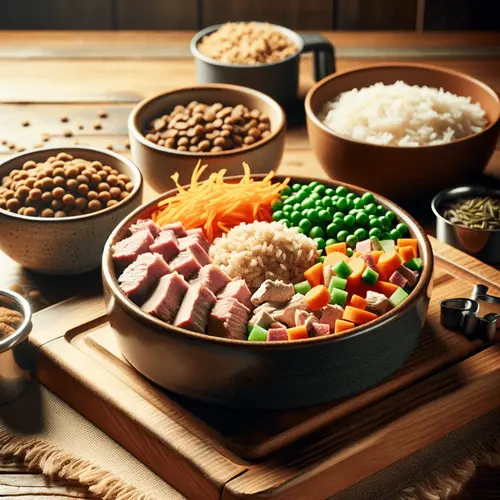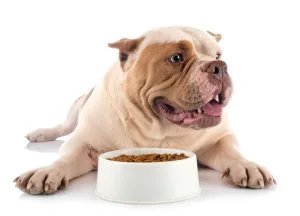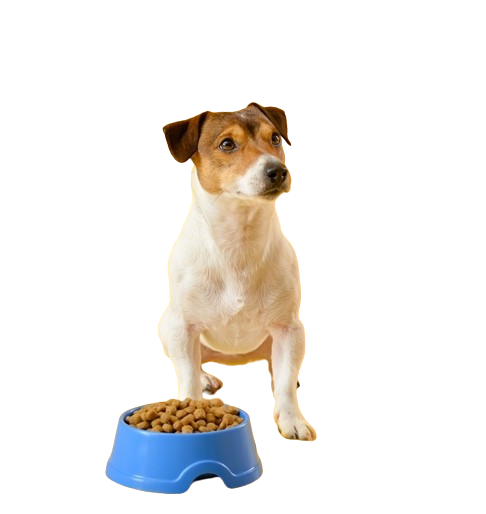Introduction
Have you ever looked into your dog’s pleading eyes and wished you could share a bite of your own dinner? Maybe you’ve scanned the endless bags of dog food at the store, feeling overwhelmed and unsure about what’s really best for your furry friend. If so, you’re not alone!
Homemade dog food is a fantastic way to take control of your pup’s nutrition, strengthen your bond, and know exactly what they’re eating.
Of course, making sure your dog gets everything they need can feel a bit daunting at first. That’s why it’s important to consult with your veterinarian before making the switch.
They’ll help you understand your dog’s specific needs and guide you on creating delicious, balanced meals.
Ready to start this exciting journey? Let’s dive into the building blocks of a healthy homemade dog diet!
Building Blocks: Protein, Fats, & Carbs
Think of your dog’s diet like building a sturdy house. Protein is the foundation – it helps your furry friend grow strong muscles and stay active. Fats are like the energy source, keeping them warm and ready for playtime. And carbs? Those are the fuel for all those zoomies and happy tail wags!
Protein Power
Your dog needs protein from quality sources. Think of it like choosing the best bricks for your house. Chicken, turkey, beef, lamb, and fish are all fantastic options. Just be sure to remove any bones, skin, or extra fat before cooking.
Fun Fact: Did you know dogs can eat eggs? They’re a yummy protein boost!
Healthy Fats
A little healthy fat goes a long way! It keeps your dog’s coat shiny and their skin healthy. You can find good fats in meats or add a bit of fish oil or plant-based oils like olive oil to their meals.
Carb Choices
Carbs give your dog the energy to be their best playful self. Brown rice, pasta, oatmeal, and even sweet potatoes are all healthy choices.
The Best Protein Sources for Homemade Dog Food
When preparing homemade dog food, it is important to choose protein sources that are easily digestible and provide the necessary amino acids for dogs. Some excellent choices include:
| Protein Source | Amino Acids Provided |
|---|---|
| Chicken and Turkey | Essential amino acids, such as lysine and tryptophan |
| Beef and Lamb | Complete protein with all essential amino acids |
| Pork | Good source of protein, but should be used in limited amounts due to higher fat content |
| Fish | Protein and essential omega-3 fatty acids, such as EPA and DHA |
The Power of Vitamins & Minerals
Think of vitamins and minerals as the magic sparkles that keep your dog healthy inside and out. They help with everything from strong bones to a healthy immune system. Just like us, dogs need a variety of these powerhouses!
Where to Find the Good Stuff
- Colorful Veggies: Carrots, spinach, and even apples pack a vitamin punch!
- Mighty Minerals: A sprinkle of eggshells adds calcium for strong bones.
- Super Supplements: Your vet might suggest a multivitamin for extra support.
Spot the Difference
Did you notice your pup’s fur got extra glossy after adding some new foods? Vitamins at work! It’s amazing how the right nutrition shows up on the outside too.
Top 3 Vitamin & Mineral Sources for Dogs
| Nutrient | Great Sources |
|---|---|
| Vitamin A | Carrots, liver, sweet potatoes |
| Calcium | Dairy, eggshells, leafy greens |
| Iron: | Red meat, beans, spinach |
Don’t Forget the Water!
Water is the most important ingredient in your dog’s diet! It helps with everything – from digestion to keeping them cool on hot days. Unlike us, dogs can’t get all the water they need just from their food.
How Much is Enough?
It depends on their size, activity level, and even the weather. But in general, your dog needs about an ounce of water per pound of body weight each day.
Watch for the Signs
Not sure if your dog’s drinking enough? Keep an eye out for:
- Dry nose
- Sunken eyes
- Excessive panting
Make Water Fun
Always have a full, clean water bowl ready. Some dogs love ice cubes in their water or even a special water fountain to keep things fresh!
Fun Fact: Did you know a dog’s body is about 60% water? That’s even more than us humans!
Making the Switch: Tips & Tricks
Switching your dog to homemade food is an exciting change, but take it slow! A sudden change in diet can upset their tummy. Your vet is your best friend during this time – they’ll guide you on the perfect pace for your pup.
Start Small
Begin by mixing a little of their new homemade food with their old food. Gradually increase the homemade portion over a week or two. This helps their digestive system adjust smoothly.
Listen to Your Dog
Pay attention to your furry friend’s reactions. Watch their energy levels, their poop (sorry, but it’s important!), and if they seem excited about mealtimes.
Ease Their Worries
Some dogs might be hesitant about the new food at first. Be patient and try warming it slightly or adding a tiny bit of tasty broth for extra appeal.
Don’t Stress!
Remember, this transition is about making your dog healthier and happier. If you and your vet are on board, your pup will feel that positive energy too!
Recipes for Every Pup
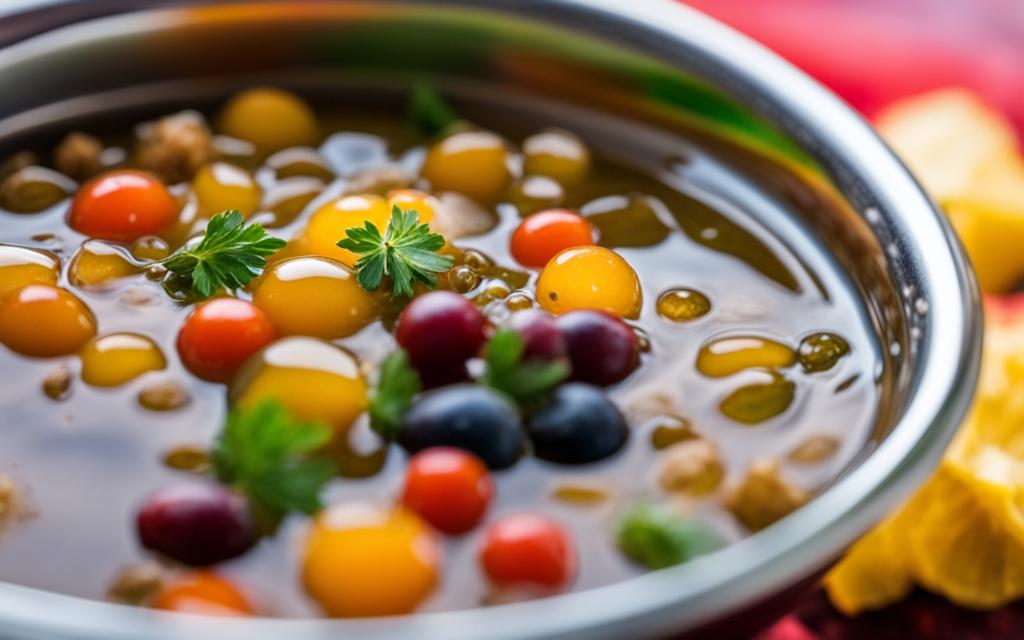
The best part about homemade dog food is that it’s not one-size-fits-all! Here are a few delicious and nutritious ideas to get you started:
Chicken & Rice Delight
- Easy to digest, perfect for beginners.
- Main Ingredients: Cooked chicken, brown rice, carrots, peas
Beefy Stew Surprise
- Hearty and satisfying for active pups.
- Main Ingredients: Lean ground beef, sweet potatoes, green beans, beef broth
Salmon Power Bowl
- Omega-3 boost for shiny coats.
- Main Ingredients: Cooked salmon, quinoa, spinach, blueberries, fish oil.
Note: Remember, portion sizes matter! Talk to your vet about how much your dog should eat based on their size and needs.
Recipe Tips
- Keep it Simple: Start with a few basic ingredients.
- Change it Up: Rotate proteins and veggies for variety.
- Prep Ahead: Cook larger batches and freeze individual portions.
Where to Get the Best Advice
Homemade dog food is a fantastic way to give your pup the very best. But the internet can be a confusing place, full of conflicting information! Here’s where to find reliable guidance:
- Your Veterinarian or a Veterinary Nutritionist: They know your dog’s unique needs and can create a personalized meal plan.
- Trusted Websites: The American College of Veterinary Nutritionists offers science-based information.
- Consulting Services Sites like BalanceIT help you make custom, vet-approved recipes.
A Word of Caution
While there are many great recipes online, not all are created equal. Always double-check with your vet, especially if your dog has any allergies or health conditions.
Unlock Your Dog’s Full Potential
Think of a veterinary nutritionist as your dog’s personal chef! They help you give your dog the very best nutrition for a long, healthy, and happy life.
The Joy of Homemade Goodness
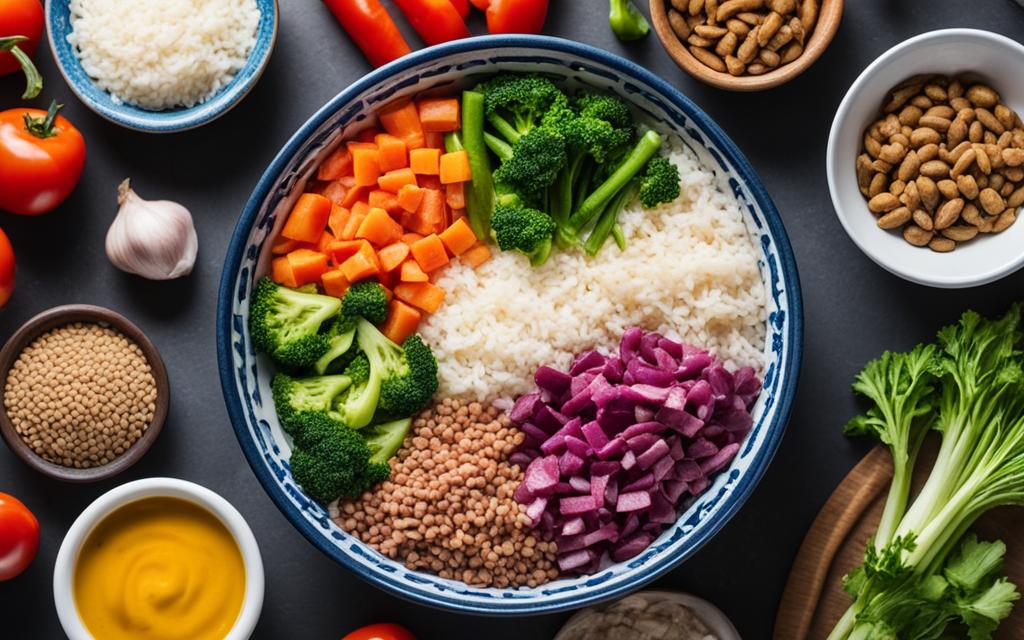
Preparing homemade food for your dog is an act of love. It means knowing exactly what they’re eating and seeing the difference a balanced diet makes in their health and happiness.
Sure, it takes a bit more effort than opening a bag of kibble. But seeing their tail wag at mealtime and their eyes sparkle with energy makes it all worth it.
You’ve Got This!
With your vet’s support and a little planning, you can give your furry friend the gift of delicious, personalized nutrition. Imagine the stronger bond you’ll build and the amazing memories you’ll make in the kitchen together.
Remember: A healthy dog is a happy dog!
| Recipe | Main Ingredients | Preparation Time |
|---|---|---|
| Chicken and Brown Rice Delight | Chicken, brown rice, carrots, peas | 30 minutes |
| Beef and Sweet Potato Stew | Lean beef, sweet potatoes, green beans, beef broth | 1 hour |
| Salmon and Quinoa Medley | Salmon fillets, quinoa, spinach, carrots, fish oil | 40 minutes |
| Veggie Lentil Surprise | Lentils, mixed vegetables (broccoli, cauliflower, carrots), vegetable broth | 45 minutes |
FAQ
A: It doesn’t have to be! With smart planning, you can make healthy homemade meals on a budget. Use seasonal produce, buy in bulk when possible, and compare prices at different stores.
A: Variety is important! Just like us, dogs need a mix of nutrients. Rotate protein sources, vegetables, and healthy carbs to keep things interesting and nutritionally balanced.
A: Freshly cooked food stays good in the fridge for 3-5 days. For longer storage, freeze individual portions and thaw as needed.
A: Absolutely! Homemade food is a fantastic option for dogs with sensitivities. Your vet can help you create a meal plan that avoids their triggers.

